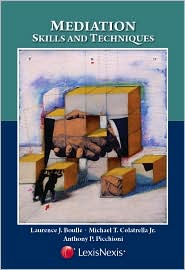If All You Have Is A Hammer, All You WIll See Are Nails!
(Originally posted at www.EnjoyMediation.com Follow me on Twitter: @mediatorjeff & @NonverbalPhD)
If you are not aware of "Mediation: Skills and Techniques" by Laurence J. Boulle, Michael T. Colatrella Jr., and Anthony P. Picchioni it is definitely one of those books all mediators, rookies and seasoned veterans alike, should have in their possession. If you already have it, good on'ya mate! (yes, I just said that Aussie saying with my New Yawk accent!)
For today's post, I want to mention the section "Function of the Mediator" (page 14); Boulle et al describe mediation as
generally the process by which the mediator uses his or her various
skills and selectively applies various techniques or interventions to assist the participants in practical decision making about their dispute.
What does that mean?
To me, it means every situation is unique yet you need the skills training and the proper understanding of how each skill can be used and applied for each situation. The cliche saying of if all you have is a hammer, everything looks like a nail comes to mind.
For mediators, if all you have is validating, all you will ever say is, "So it sounds like you are upset." Good luck with that.

Having the skills, and realizing that each skill needs to be used differently, even in similar situations reminds me of two of my other favorite things- poker and nonverbal communication.
In Texas Hold'em Poker (we really should have a mediator's only tournament at the next big conference, right?), you could get the same hand three times in a row, including Aces, and all three times the hand could play completely differently. You need to adapt the way you 'play' your Aces.
In nonverbal communication, scratching one's neck could mean nervousness, just being itchy, or possibly boredom. Looking at clusters, the context and congruence with the the words being spoken are all important in discerning the nonverbal cue.
My, point, which I think I have, is having the skills and ability to know which skill to use and how to use it is important.
Three ways I suggest to sharpen those skills is through:
1. Reading and studying mediation and conflict resolution books
2. Observation. Watch others, to see how they use the same skills you use... only differently.
3. Practice. Have others observe you and get feedback. Yes those feedback sheets are important from your parties but they are very limiting and biased. Have fellow peers observe you and/or attend workshops and trainings where you are able to participate in role plays to get feedback.
About
@ADRHub Tweets
© 2024 Created by ADRhub.com - Creighton NCR.
Powered by
![]()

You need to be a member of ADRhub - Creighton NCR to add comments!
Join ADRhub - Creighton NCR